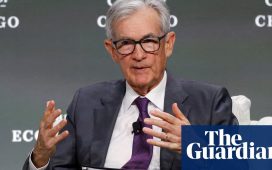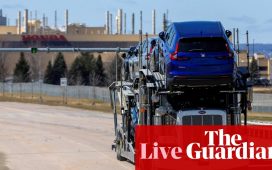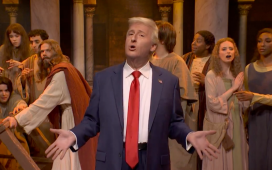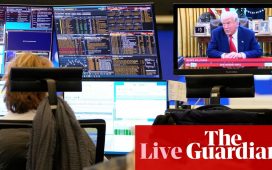BANK OF ENGLAND INTEREST RATE DECISION
Newsflash: The Bank of England has cut UK interest rates to 5%, from 5.25%, the first reduction in borrowing costs in over four years.
The BoE has decided to ease policy following the drop in inflation back to its 2% target in May and June this year.
This is the first time that the Bank has lowered interest rates since its emergency rate cut in March 2020.
It had raised rates from 0.1% in December 2021 to 5.25% in August 2023, where they had remained over the last year.
Today’s cut should ease some of the pressure on UK borrowers, if mortgage lenders pass this cut on…..
Details to follow…
Key events
BoE: policy must remain restrictive until inflation risks have dissipated
The Bank of England cautions that monetary policy will need to continue to “remain restrictive” for sufficiently long until the risks to inflation returning sustainably to its 2% target in the medium term have dissipated further.
In the minutes of this week’s meeting, it says:
The Committee continues to monitor closely the risks of inflation persistence and will decide the appropriate degree of monetary policy restrictiveness at each meeting.
Bank split 5-4 on rate cut
As suspected, today’s decision was a narrow one.
The Bank’s monetary policy committee has voted by a majority of 5–4 to reduce Bank Rate by 0.25 percentage points, to 5%.
The Bank says:
Five members (Andrew Bailey, Sarah Breeden, Swati Dhingra, Clare Lombardelli and Dave Ramsden) voted in favour of the proposition.
Four members (Megan Greene, Jonathan Haskel, Catherine L Mann and Huw Pill) voted against the proposition, preferring to maintain Bank Rate at 5.25%.
BANK OF ENGLAND INTEREST RATE DECISION
Newsflash: The Bank of England has cut UK interest rates to 5%, from 5.25%, the first reduction in borrowing costs in over four years.
The BoE has decided to ease policy following the drop in inflation back to its 2% target in May and June this year.
This is the first time that the Bank has lowered interest rates since its emergency rate cut in March 2020.
It had raised rates from 0.1% in December 2021 to 5.25% in August 2023, where they had remained over the last year.
Today’s cut should ease some of the pressure on UK borrowers, if mortgage lenders pass this cut on…..
Details to follow…
Just time for one last look at the money markets – which suggest there’s a 63% chance of an interest rate cut in two minutes….
The MPC took its decision last night, but they’ll announce it on the dot of noon.
The pound slumped to a three-week low on speculation that the Bank of England may start cutting interest rates later in the day. pic.twitter.com/9UJIW6zI67
— D.A. Market Online Trading (@itradeph) August 1, 2024
Although Goldman Sachs expects a UK interest rate cut at noon today, they also warn that the decision is a close call.
GS economist James Moberly predicted last week that BoE governor Andrew Bailey, deputy governors Sarah Breeden and Clare Lombardelli would join existing doves Swati Dhingra and Dave Ramsden, and vote for a cut today. That would give a 5-4 majority on the monetary policy committee.
Moberly wrote:
The totality of the data continues to show significant progress on curbing inflationary pressures, and we think that the updated projections will continue to show inflation slightly undershooting the target two to three years ahead even if the MPC lowers Bank Rate in line with the market-implied path.
We think that this will be enough for Bailey, Breeden, and Lombardelli to join Ramsden and Dhingra in voting for a cut, despite recent strength in services inflation.
That said, limited communication from these Committee members means that their votes are difficult to predict. Taken together with the cautious tone of Chief Economist Pill’s recent speech, which indicates that he is unlikely to support a cut, we therefore view the decision to lower Bank Rate as a close call and see a low bar for the MPC to delay the first cut until September.
Chief economist at PwC UK, Barret Kupelian, explains how an interest rate cut could help the UK economy:
“Economic theory states lower interest rates lead to cheaper borrowing costs, as a result helping propel spending across the economy. The prospect of lower interest rates in the UK in the backdrop of an extraordinary cost of living crisis and anaemic growth should therefore be welcome news.
How households will react, however, is not as clear as what really drives their behaviour is their perception, rather than the reality, of the economic outlook.

Julia Kollewe
Back in the City, Smith & Nephew shares have jumped by nearly 11% to a one-year high this morning.
The company, which makes artificial hips and knees, wound dressings and other surgical materials, reported better than expected half-year profits on the back of higher demand for its orthopaedic products.
Andy Murray, who made it to the quarter finals in doubles in the Paris Olympics and is playing tonight, had the firm’s hip resurfacing device fitted in his right side in 2019.
Smith & Nephew’s share price hit £12.45 earlier and is now up by nearly 6% at £11.89.
The shares have risen by a fifth in the past month, after the activist investor Cevian disclosed that it had taken a 5.1% stake in Smith & Nephew, making it the firm’s second-biggest shareholder. Previously, they had lost mare than half their value since an all-time high hit in February 2020.
Profit rose by 12.8% to $471m in the half year to 29 June, ahead of analysts’ expectations of $462m. The company has struggled in recent years after the Covid-19 pandemic led to surgery delays and supply disruptions, and has also been hit by high raw material costs following Russia’s invasion of Ukraine.
Chief executive Deepak Nath said:
“There is still more work to be done and we expect to see further progress in the second-half of the year.”
Revenue from its orthopaedics division rose by 5.8% to $581m in the second quarter, lifted by strong growth in hip and knee implants outside the US, as well as from other reconstruction procedures.
Pound falls as interest rate decision approaches
Tension is mounting in the City of London as clocks tick towards noon, and the Bank of England’s interest rate decision.
Today’s decision is on a knife-edge; the money markets currently indicate there is a 59% chance of a cut in borrowing costs today, to 5%, and a 41% chance of no change today.
As covered in the introduction, interest rates have been set at a 16-year high of 5.25% since last August, since when the Bank has paused its rate-hiking cycle, as inflation fell back to its 2% target.
The pound is still in the red – currently down 0.6% or 0.8 of a cent at $1.2775, having hit a four-week low this morning.
Bas Kooijman, CEO and asset manager of DHF Capital, says:
The British Pound is facing pressure as investors await the Bank of England’s (BoE) decision on interest rates, later today.
Recently, the Pound has weakened, reaching a three-week low and falling against the euro and the dollar. This decline is partly due to expectations that the Bank of England may cut rates. Markets strongly expect the Bank of England to lower rates from 5.25%, which has also contributed to drops in British two-year and five-year bond yields.
As covered earlier, several banks expect the BoE’s monetary policy committee to split 5-4, with a small majority in favour of cutting rates today.
Hedge fund owner Paul Marshall is closing in on The Spectator magazine, reports Sky News’s Mark Kleinman.
Sources have said Marshall’s Old Queen Street Ventures vehicle could strike a deal to buy the Spectator as soon as this month.
Marshall, who holds a stake in GB News, had been expected to be a frontrunner in the race to buy the Telegraph – but Sky say there is “growing doubt” about whether he would participate in the newspaper auction.
Exclusive: Sir Paul Marshall’s Old Queen Street Ventures could strike a deal to buy The Spectator as soon as this month, even as doubts have grown about whether the Marshall Wace co-founder intends to pursue a bid for The Daily and Sunday Telegraph titles. https://t.co/w4levEWclQ
— Mark Kleinman (@MarkKleinmanSky) August 1, 2024
Both the Telegraph titles, and the Spectator, are up for sale after the government blocked their sale to an Abu Dhabi-backed fund.
Marshall has described himself as “a committed Church of England Christian” – he worships at the evangelical Holy Trinity, Brompton – and has said he wants to make “free enterprise once again a pillar of human flourishing”.
There is cautious optimism in the UK factory sector, reports James Brougham, senior economist at Make UK.
Following today’s rise in the UK manufacturing PMI, Brougham says:
“As the first issue of this data since the new government came to power, all eyes have been on what this significant electoral majority may manifest for industrial confidence in the second half of the year. Cautious positivity is in the air as the sector has seen continued expansion for three consecutive months, the longest sustained positive run for two years.
Eased worries have translated into a slowdown in destocking, subsequently returning demand for the sector’s products to growth. However, just as this demand returns, so too does the ghost of the past that haunted the sector for so long. Manufacturer’s input price inflation has struck its highest point in one and a half years, reminding the sector that it is uniquely sensitive to demand-side pressures.
Given activity should continue to pick up towards the ends of the year, this input price pressure will likely continue, so the perfect intervention from Government of a long term and robust industrial strategy delivered at speed is more needed than ever to restore investment confidence across the sector.”
Eurozone unemployment rises to 6.5%
Back in the eurozone, unemployment has unexpectedly risen.
The jobless rate across the euro area rose to 6.5% in June, new data from eurostat shows, up from 6.4% in April and May.








